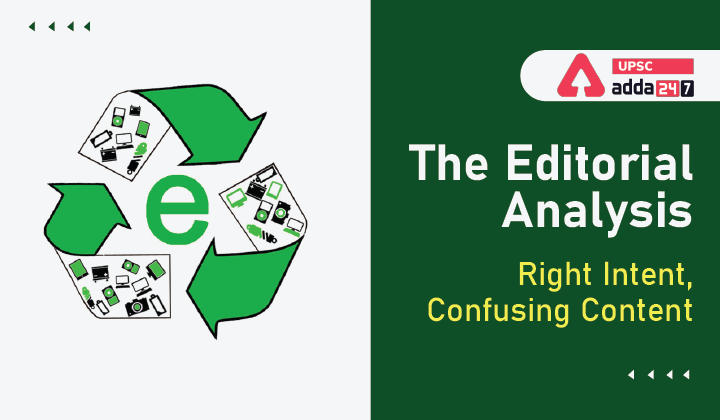Table of Contents
E waste management in India: Relevance
- GS 3: Conservation, environmental pollution and degradation, environmental impact assessment.
E waste management rules: Context
- Recently, Ministry of Environment has released the Draft E-waste Management Rules, 2022, for public comments. Last month marked a decade since the E-waste (Management and Handling) Rules came into effect in India.
E waste Management Rules 2022: Key points
- The draft rules state that producers of e-goods have to ensure that at least 60% of their produced e-waste is recycled by 2023.
- The draft rules also state that producers of e-goods have to ensure that at least 60% of their produced e-waste is recycled by 2023.
- Introduction of a Steering Committee to oversee the “overall implementation, monitoring, and supervision” of the regulations.
E Waste Management Rules 2022: Issues
- Large-scale recycling of e-waste is still in its infancy in India. Most of the recycling of valuable material is carried out within the informal sector using inefficient and unsafe technologies.
- If the regulatory targets were to create a vibrant market for recycling, the existing formal and informal players would have to play a crucial role. However, the complete silence on regulating registered collectors, dismantlers, and producer responsibility organisations is puzzling.
- The Rules propose the Chairman of the CPCB as the Chairperson of the Committee, which would include representatives of the Environment Ministry, the Electronics and IT Ministry, and the associations of producers and recyclers. It, however, has not much representation from science/academia and civil society organisations.
E waste problem in India
- According to a report released at the World Economic Forum 2018, India ranks 177 amongst 180 countries and is amongst the bottom five countries on the Environmental Performance Index 2018.
- Also, India is ranked fifth in the world amongst top e-waste producing countries after the USA, China, Japan, and Germany.
- India recycles less than 2 per cent of the total e-waste it produces annually formally.
- India generates more than two million tonnes of e-waste annually, and also imports huge amounts of e-waste from other countries around the world.
- Dumping in open dumpsites is a common sight which gives rise to issues such as groundwater contamination, poor health, and more.
- E-waste collection, transportation, processing, and recycling is dominated by the informal sector.
E waste meaning?
- Electronic waste or e-waste is generated when electronic and electrical equipment become unfit for their originally intended use or have crossed the expiry date.
- Examples: Computers, servers, mainframes, monitors, compact discs (CDs), printers, scanners, calculators, fax machines, battery cells, cellular phones, TVs, iPods, medical apparatus, washing machines, refrigerators, and air conditioners are examples of e-waste (when unfit for use).
- E-waste typically consists of metals, plastics, cathode ray tubes (CRTs), printed circuit boards, cables, and so on.
- The presence of toxic substances such as liquid crystal, lithium, mercury, nickel, polychlorinated biphenyls (PCBs), cadmium, chrome, cobalt, copper, and lead, makes it very hazardous.
Read current affairs for UPSC





 TSPSC Group 1 Question Paper 2024, Downl...
TSPSC Group 1 Question Paper 2024, Downl...
 TSPSC Group 1 Answer key 2024 Out, Downl...
TSPSC Group 1 Answer key 2024 Out, Downl...
 UPSC Prelims 2024 Question Paper, Downlo...
UPSC Prelims 2024 Question Paper, Downlo...




